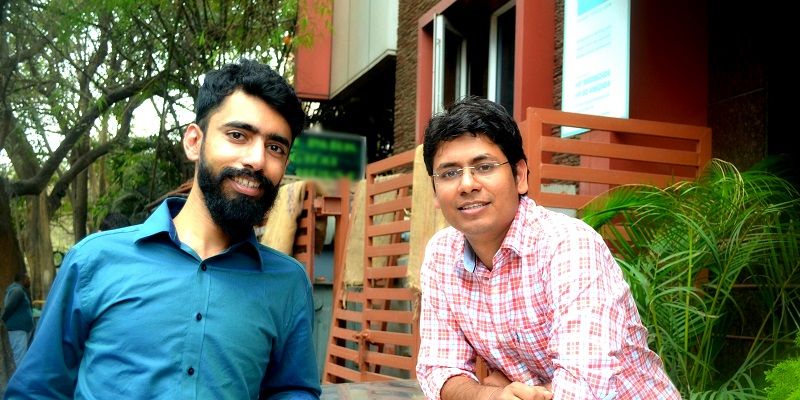Training over 50,000 students in critical thinking, Open Door seeks to mould India’s future scientists
Open Door is a platform that helps children learn math and science content with a focus on concepts and scientific thinking.
After quitting his job at Ashok Leyland to pursue teaching, 30-year-old IIT Madras alumnus Aneesh Bangia pondered upon why India has been unable to produce quality scientists in the manner other nations have. He could see no other conclusion but that, in our schools, while we focus on teaching content, we do not spend enough time on making children think.
It was in observing this that Aneesh, along with his friend from IIT Madras, 29-year-old Abhishek Kariwal, started Open Door, a platform that works towards helping children and young adults develop scientific thinking using the concepts of maths and science in their syllabus.
Their focus is not on helping children learn the content, but on helping them develop the habit of thinking and questioning. Open Door currently aims to implement mastery learning in over 100 schools, where around 50,000 students are discovering greater depths to learning through repeated questioning.
Rather than keeping on teaching one chapter after another, as was done before, teachers now teach a concept, and by using Open Door’s Mastery Program, make sure that the concept is understood in depth before moving forward. This helps 80 percent of the students obtain mastery of every important concept in the curriculum.

The beginnings
One day, Aneesh called Abhishek to ask what he was up to. Abhishek was at the time thinking about entrepreneurship in education, and was experimenting with different ideas. Over several rounds of discussion, the two realised that their thoughts on education and how to solve the problems present in the sector closely aligned. And thus, Open Door was born. Aneesh says,
“We began by taking up learning centres, one each, in Pune and Bengaluru, where we taught children in small groups after school hours, mainly by questioning them. We realised that by questioning children repeatedly, they develop the habits of critical thinking. This idea was accepted by many parents, but we eventually realised that it was not very scalable.”
In late 2013, a school in Pune approached the team to improve learning in their school, and this provided them with the opportunity to experiment. “Since students spend a lot of their time in schools, we knew that if we really wanted to change the learning habits of students, we had to enter the school system. We spent a few months thinking, and developed the mastery program for the school. The program drove many children to master different concepts in science and maths,” says Aneesh.
The product and the focus
Open Door’s current product is implemented in schools. The startup’s ‘Mastery Program’ helps teachers ensure mastery of one concept before moving on to the next. This program is integrated within the school curriculum and becomes a part of classroom teaching. Like any startup, in the beginning, Open Door’s co-founders did everything – from developing the product to selling the product to schools, to making sure it was implemented successfully.
“We remember how we would spend our time from the morning to the evening helping schools implement the program or approaching prospective schools, and then spending time in making the product from evening till early morning the next day. There have been so many times where we have prioritised ensuring that the problem at a school is solved immediately over eating our lunch,” says Aneesh.
At the same time, the team was making little money from their initial set of schools, and they had to do part-time teaching to sustain themselves. Bootstrapping was a challenge, and there were several times when they would barely have any money in their bank accounts.
Aneesh is quick to point out that they are in the education industry not only because they saw it as profitable, but also because they wanted to solve a genuine problem that has always existed in our education system, a problem that no one has been able to solve on a large scale.
“We first thought about making a product that could solve the problem effectively, and then to make it into a scalable product, and later to turn it into a business. We understand how children learn, and our foundation is very strong,” says Aneesh.
Space and future
Edtech is one of the biggest sectors in the Indian startup ecosystem, and within the sector, tutoring and K12 is one of the largest segments. A Kaizen report suggests that edtech is amongst the largest capitalised spaces in the country, with an annual government spending at $63 billion and a private spend of $56 billion.
Standing tall in the segment at the moment are Byju’s, which already has $140 million in its kitty, and Mumbai-based Topper. The report suggests that since 2007, close to $1.1 billion has been pumped into the space.
Open Door claims to have clocked a revenue of Rs 50 lakh in 2016-17 by only working with 32 schools. The venture is now poised to clock a revenue of Rs 3 crore this year by working with over 100 schools. It has raised $150,000 in funding from an angel investor. “The investment came at the right time and has helped Open Door scale up its business and product capability much faster,” says Aneesh.
Currently a team of 10, Open Door intends to grow to over 25 employees by June this year. “We plan to implement the Mastery Program in 1,000 schools by 2019-20. What’s more, Open Door is going to launch its first online learning program in the B2C space very soon,” says Aneesh.











